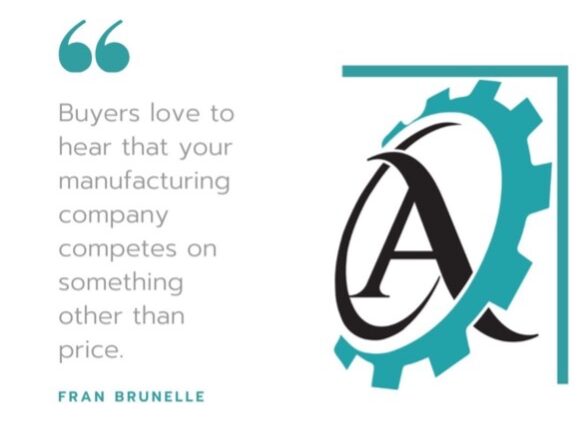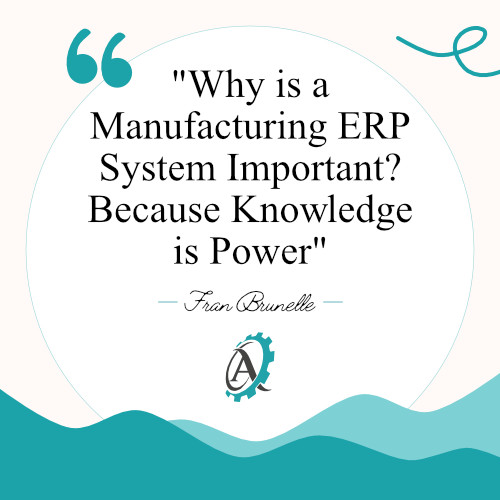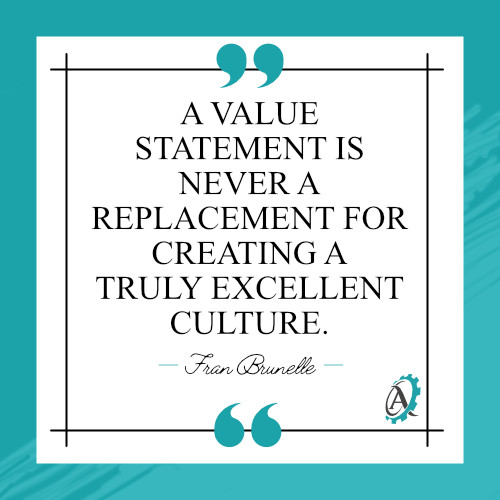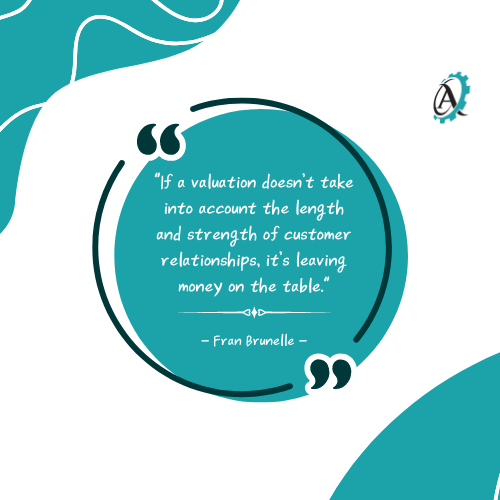Are there things you can do to ensure your manufacturing company sells for maximum value? In this article, we’ll share a specific list of ten things. If you nail all ten, your company will generate competition for the acquisition, sell at a higher price, and likely sell quicker than others on the market.
Here are 10 Tips For Selling Your Manufacturing Company For Maximum Value. We’ll discuss each in greater detail below:
- A Strong Management Team in Place
- Competing on Quality, Rather Than Price
- An ERP System Providing Full Visibility into the Operation
- A Strong Culture
- Remaining Current on Machine Tool Technologies
- Strong and Tenured Customer Relationships
- Younger Members of the Workforce
- Excess Capacity
- GAAP Accounting
- Strong Gross & Net Margins
The items on the above list are what lower-middle market manufacturing buyers most often seek in a target acquisition.
1. A Strong Management Team In Place
This is one of the most important things quality buyers look for. There are several reasons they look for this, outlined below:
- If there’s NO team in place and something happens to you before the company is transitioned, the buyer’s investment could be at risk.
- If there isn’t a STRONG team in place, the business is too dependent on the Seller.
- The lack of a management team means that a foundation has not been laid for growth. Acquirers pay more if this work has already been done.
- Most top acquirers are playing the game of business in a larger sandbox than you. That’s why they can afford to buy your business. But they likely have multiple locations, so having a strong management team is a top requirement in a target acquisition.
- Top acquirers want to buy a business, not a job.
2. Competing On Quality Rather Than Price
Manufacturing companies are typically working on either a high volume – low margin model or a low volume – higher margin model. Both models can be successful if done right. However, if a company is surviving solely because they’re the lowest price product in the marketplace, they can usually easily be replaced. Manufacturing companies that do more difficult work with tight tolerances are harder to be replaced as a vendor. Their work is typically higher margin too, which buyers love.
A great example of this is a fabrication company my firm recently listed. They differentiate themselves by only working on tight tolerance for cosmetically critical work. Because not many fabricators do this type of work, the company is able to command higher margins. This, combined with their high scores on the other 10 Tips for Selling Your Manufacturing Company for Maximum Value, means that some of the best-quality buyers in the nation are competing for the acquisition.

3. An ERP System Providing Full Visibility Into The Operation
Top buyers expect to have complete visibility into every aspect of the business. Yes, ERP system implementation is time-consuming, pricey, and can be painful. However, buyers will pay more for a company that has already done this. Recently a top buyer rejected an otherwise quality listing because they didn’t want to go through the pain of doing this. Why is this so important? Here’s what a good ERP system will do:
- Complete shop floor management, including scheduling, tracking and reporting on manufacturing processes
- Provide intel on worker productivity
- Provide precise intel on true profitability per job
- Material requirements planning – allows owners to make data-based decisions with full knowledge of inventory and production availability
- Has live up-to-the-minute accurate inventory
- Incorporates the quoting process
- Incorporates the accounting function and payroll
An ERP system provides full and complete visibility into every aspect of the business. Here’s a real example of why this is important. My firm had a listing where the client took on a new job which was supposed to add about $500K in profitability. At the end of the year, they had lost money. What happened?
This question sparked a detailed Excel spreadsheet showing every customer and the profitability of each job. What they discovered was that the $500K-in-profit job wasn’t profitable after all; it was actually costing them money. Had this company been operating with a good ERP system, they would have quoted the job differently and/or realized their mistake much sooner.

4. A Strong Culture
It’s not just a strong management team that buyers want to see but a strong culture too. A strong culture means that people take pride in their work. They understand the importance of the products they’re making. They strive for excellence and love being challenged. Often business owners will tolerate bad behavior because they’re afraid of having to replace the worker. You get what you tolerate.
It’s very in vogue to have a stated list of company values. That’s nice, but if you’re not living it, it’s meaningless. Enron’s value statement was:
- Respect
- Integrity
- Communication
- Excellence

To create a great culture, leaders must be willing to have difficult conversations on a regular basis.
5. Remaining Current On Machine Tool Technologies
Top manufacturing companies are run like they’re not for sale, and top buyers pay more for them. Buyers will look at the Capex requirements of the business. If you’ve consistently upgraded your machine tools, less capital expenditure will be required on the part of the buyer in the first few critical years of their ownership. Many business owners don’t want to reinvest in the approach to retirement. The manufacturing business owners that do sell their companies at higher multiples.
Robotics is quickly becoming a quality buyer magnet. We recently sold a CNC component manufacturer serving the large agriculture and hydraulics markets. Adding robotics units did two important things for them:
- One project none of their workers liked (because of the weight of the part) was now automated. This was a high-margin project, and it now was primarily done by a machine that didn’t need to take a break. It freed the workers to take on other high-margin projects.
- The robotic units became a fabulous recruiting tool. As potential workers toured the plant, they saw a modern, clean work environment that the owners were continually investing in.
6. Strong Tenured Customer Relationships
This is a no-brainer. Keeping good customers is easier than obtaining new ones. Top buyers will look at the length and strength of your customer relationships. This is one of the 175+ data points my firm looks at when doing a valuation of a manufacturing company.
When considering the value of a manufacturing company, here’s what we look at in regard to customer relationships:
- The length of the relationship.
- What is the manufacturer making for the customer?
- How easy would it be for the customer to replace the manufacturer?
- Is the relationship driven by something other than price?
- Is the customer in a sector that is projected to grow?
- Is the component being made, even though at a high margin, only a small fraction of the overall cost of the product it goes into?

7. Younger Members of The Workforce
If everyone on your team is ready to retire when you are, or shortly thereafter, you’re likely heading to the auction block, not an M&A transaction. Everyone complains about the skills gap. Top shops are proactive about ensuring a pipeline of skilled workers. Here’s how smart manufacturers are closing the skills gap. Quality buyers expect to see both tenured and younger workers with a system in place for transitioning the “tribal knowledge” to the next generation of workers.
8. Excess Capacity
Buyers want to know that they can grow the business to a certain size without having to worry about expanding the building or moving the business. To attract a top buyer at a top price, you have to be able to speak accurately into the capacity questions. Here are the top questions buyers ask on this issue:
- What capacity are you currently operating at? Is this only one shift?
- How much could the business grow in its current location?
- Would the addition of certain machine tools change the capacity? To what degree and cost?
- Would the addition of workers change the capacity? To what degree and how many people, and in what positions?
Potential clients often want to sell the real estate with the business. They want to know if this is likely to happen. The answer is always driven by the answers to the above. If there’s excess capacity at an appropriate level, there’s a good possibility that the buyer of the business will want the real estate. If the capacity issue is unclear, they will seek to rent, perhaps with an option to buy. But they won’t buy until they have a handle on how much they can grow the business at its current location.
9. GAAP Accounting
Generally Accepted Accounting Principles are a must if you expect to attract a top buyer at a great price. A quality buyer is not going to sift through your credit card statements for the last three years to determine what was a personal expense. If you’re claiming that your gross margin is 70%, but you have no labor calculated in the cost of goods sold (COGS), your margin isn’t what you think it is. This topic is so broad that I could write a book on it. Instead, I’ll share two real stories that will drive the point home.
The Client We Fired
My firm took on a client whom we were excited to work with. From a manufacturing perspective, they were doing almost everything right. They had a great team, a beautiful facility, and a good reputation in their industry. Large discrepancies in the client’s tax returns and financial statements led to a call with their CPA. During the call, the CPA said that we shouldn’t be going by the tax returns or the financial statements but by a third set of books he kept on the company. Seriously? This happened many years ago. Today my firm would reject them as a client. We fired them.
The Potential Client We Refused To Work With
Last year we were approached by a potential client. They were a great lower-middle market manufacturing company with a long history and great reputation. During the valuation process, we came up with an adjusted EBITDA number that was dramatically different than what we had been told. The difference was shareholder compensation, which appeared nowhere on their books. The reason? Their CPA convinced them to make payments to him, and he, in turn, would write checks to them personally to avoid payroll taxes. They were shocked when I rejected them as a client. Their genius CPA lost them millions in value. It was a real shame.
SHENANIGANS TO AVOID TAXES ARE COSTLY IN VALUE AND POTENTIALLY CRIMINAL. Top-quality buyers won’t go near companies like this.
10. Strong Gross And Net Margins
How do top buyers define strong gross and net margins? If you’re at 35% GM and 15% net, you’ll be attracting strong interest in your business and solid offers.
Conclusion
Follow these 10 Tips For Selling Your Manufacturing Company For Maximum Value, and you’ll end up with a quality buyer at a quality price. It’s rare that companies nail every one of these. If you’re lagging in some, it doesn’t mean your company can’t be sold. This is meant to be a guide and a goal to aim for.
With almost 30 years of experience selling manufacturing companies nationally, I know what drives companies to sell at the highest possible prices. What would your manufacturing business likely sell for?

